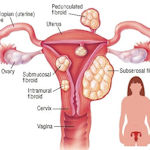
Dr. Maxwell Nartey
Professor of Symptometric Science, American School of Symptometry, NFP
Heavy menstrual bleeding
Women who have fibroids tend to have heavy menses, or prolonged heavy menses. This is because the pressure on the fibroid caused by the volume of menstrual blood, squeezes some blood out of the fibroid. However, after menses, the fibroid would collect and store unwanted blood all over again.
It is the cycle of squeezing out blood and collecting and storing unwanted blood that makes the woman to have prolonged heavy menses; and usually, this goes on for years.
Massive blood loss would make the woman anemic. If she does not produce templates to make the iron-based enzymes to speed up the production of acetylcholine for her brain, there will come a time when she would become forgetful. Dementia would follow forgetfulness, and Alzheimer’s disease will follow dementia.
Generally, women who have dementia have a long history of heavy menses or prolonged menses, as well as poor memory.
Hysterectomy, advantages and disadvantages
Is hysterectomy the solution to the fibroid crisis? No. It is not. Why not? The answer is, all the body parts are interconnected, interrelated, integrated, and interdependent. For this reason, removing one body part, surgically, will cause an imbalance in the mind/body connection. It is this imbalance that will cause one crisis after another in the woman who had hysterectomy.
The good news about partial hysterectomy or total hysterectomy is, the woman will no longer have heavy menses. The bad news which has never been disclosed until now is, there will be two consequences for no longer having menses. What are these consequences?
First, there will be void. The pituitary gland will no longer be able to communicate with the uterus; and this will cause tension. This tension will produce the kind of negative energy that will deplete acetylcholine for memory, alertness, and mental acuity. Then, it will deplete serotonin, the mood regulator, and the healing neurotransmitter. As a result, the woman will become irritable, impatient, unforgiving, etc. Her libido would be extremely low.
Many women who had hysterectomy complained of vaginal numbness or vaginal heat, or extreme vaginal dryness. They were no longer excited about intercourse, thereby compelling their husbands to look elsewhere for some amorous attention. Hysterectomy has not only ruined marriages and relationships. It has also ruined the lives of the women who had the procedure.
The second reason hysterectomy cannot be the solution to the fibroid crisis is, it will cause the dirty blood crisis.
At the mental level, dirty blood would deplete acetylcholine, serotonin and melatonin. Melatonin is a hormone and serotonin and acetylcholine are neurotransmitters.
The non-replenishment of acetylcholine will cause forgetfulness, amnesia, dementia and finally Alzheimer’s disease.
In the Alzheimer’s wards all over the world, old women outnumber old men by 10:1. Also, the non-replenishment of acetylcholine will cause attention deficit disorder, lack of focus or the inability to concentrate, wandering mind, absentmindedness, confusion, lack of mental sharpness or acuity, poor judgment, irrational behavior, etc.
The non-replenishment of serotonin will cause anxiety, panic attacks, apprehension, insecurity, indecision, irritability, moodiness, anger, impatience, mistrust, suspicion, etc.
The non-replenishment of melatonin will cause severe insomnia, and a person who cannot sleep will be agitated most of the time, edgy, snappish, unpleasant to talk to, and may have a horrible personality. Such individuals do not make good co-workers or colleagues.
The truth is, every person has dirty blood in their arteries and veins, but women’s blood is far dirtier than men’s blood. Here is why.
Women produce more hormones than men. It is because they produce more hormones than men that their metabolism is faster than that of men. Any individual who has fast metabolism will also produce more debris than a person with slow metabolism. It is the amount of metabolic debris a person produces that determines the amount of filth in their circulatory and lymphatic systems.
Dirty blood has been the source of sickness since the beginning of the human race. Blood that is full of sludge will cause stasis and inertia. Stasis in the veins will cause varicose veins or spider veins. More women than men have varicose veins. Also, more women than men have hair, skin and nail problems. This is because their skin absorbs and retains much more filth from blood than the skin of men.
Why do women have menses and men do not? Their anatomy is designed to allow dirty blood to flow out every month, and they have the corpus luteum to make sure that menstruation keeps taking place every month until they are 54 or 55-years-old.
The women who stop menstruating before age 54 will have a dirty blood problem just like a woman who had hysterectomy. Dirty blood in a woman is supposed to flow out after one month. It is not supposed to be kept in the body and recirculated. Also, the outflow of such blood is not supposed to be stopped. Total hysterectomy stops menstruation. Symptometry is totally against any medical procedure that interferes with the work of Creation.
Can hysterectomy stop the other cellular needs of a woman? No, it cannot. Another question is, can gynecologists address the cellular needs of a woman who had hysterectomy? No, they cannot. They will prescribe pharmaceutical drugs.
Unfortunately, pharmaceutical drugs have never cured profuse sweating, overheating (hot flashes), excessively dry skin, itching in different parts of the body, drooling, over salivation, thinning hair, alopecia, female baldness, cramps in the calves, in the feet and toes, occipital headaches, dry vagina, boils, abscesses, inflammations, severe constipation, mental aberrations, etc. All of which are the direct consequences of dirty blood.
Life after hysterectomy has not been easy, and it will never be easy. Read more about the dirty blood saga in one of my articles on this website.
Generally, women live longer than men because they get rid of dirty blood once a month through menstruation. Unfortunately, many women can no longer outlive men because dirty blood will overwhelm their cerebellum.
The cerebellum houses the vasomotor center, the cardiac center and the respiratory center. Dirty blood overwhelming these three centers will cause early death.
Frequent occipital headaches indicate that the cerebellum is overwhelmed with junk. Usually, individuals who experience occipital headaches have a short life expectancy.
The question is, if the disadvantages of hysterectomy outweigh its advantages, why go for a procedure that is extremely detrimental to one’s overall long-term health?
The final question is, if hysterectomy should not be an option, what should be the most viable option to consider? The answer is, consider Symptometry, which is now available. Read the article on symptometric science in the discoveries section of this website to know more about the benefits of Symptometry.
Read the next segment of this series titled UNDERSTANDING FIBROIDS PART 3
© Copyright 2021, The American School of Symptometry, NFP. No part of this publication may be reproduced or transmitted in any form or by any means, electronic or mechanical, including photocopying, recording, or by any information storage and retrieval system without the written permission of The American School of Symptometry, NFP. Library of Congress copyright number Txu 1-621-370, Washington D.C.


